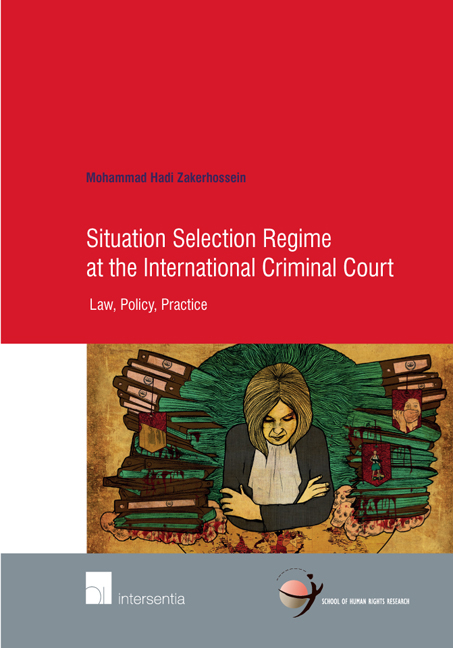Book contents
- Frontmatter
- Contents
- Acknowledgment
- Abbreviations
- General Introduction
- Part One Formulating the Concept of Situation in the Rome Statute Sense
- Chapter I Situation v. Case
- Chapter II Defining Elements of the Notion of a Situation
- Part two Situation Selection Process
- Part three Situation Selection Criteria
- Part Four Situation Selection In Light Of Expressivism
- Conclusion
- Bibliography
- ICC Case Tables
- OTP Documents
- About the Author
- School of Human Rights Research Series
Chapter II - Defining Elements of the Notion of a Situation
from Part One - Formulating the Concept of Situation in the Rome Statute Sense
Published online by Cambridge University Press: 13 October 2018
- Frontmatter
- Contents
- Acknowledgment
- Abbreviations
- General Introduction
- Part One Formulating the Concept of Situation in the Rome Statute Sense
- Chapter I Situation v. Case
- Chapter II Defining Elements of the Notion of a Situation
- Part two Situation Selection Process
- Part three Situation Selection Criteria
- Part Four Situation Selection In Light Of Expressivism
- Conclusion
- Bibliography
- ICC Case Tables
- OTP Documents
- About the Author
- School of Human Rights Research Series
Summary
The preceding chapter indicated that the concept of a situation differs from the notion of a case. Thus, a question arises: what is a situation? A situation, as imagined by the Rome Statute, is a multifaceted notion. It embraces two pillars, namely the jurisdictional pillar and the contextual element. This chapter elaborates the constituent elements of the concept of situation.
THE JURISDICTIONAL ELEMENT OF A SITUATION
The Court's jurisdiction is not absolute. It has some constraints, including temporal, territorial and personal confines, besides its subject-matter constraint. In addition, the jurisdiction of the ICC is dormant and it is triggered and activated over a specific situation. In the Rome Statute sense, a situation determines the jurisdictional framework within which the Prosecutor may exercise her discretion in the context of a specific crisis. Situation as a jurisdiction-oriented notion is composed of, inter alia, those jurisdictional parameters enshrined in the Rome Statute. These statutory parameters are applied to each crisis in which the Court intents to intervene and determine the boundaries of the Court's intervention, particularly in terms of time and location. PTC I in its decision of 17 January 2006 submits that situations “are generally defined in terms of temporal, territorial and in some cases personal parameters.” Regulation 49 of the Court's Regulations is helpful here. The provision relates to the Prosecutor's request for an authorization to initiate investigations. However, it is not limited to this instance, since there is no difference between the meanings of a situation either in context of communications or referrals. According to the Regulation, a situation shall indicate as a minimum: “(a) a reference to the crimes, (b) the places of the alleged commission of the crimes, e.g. country, town, as precisely as possible; (c) the time or time period of the alleged commission of the crimes; and (d) the persons involved, if identified, or a description of the persons or groups of persons involved.”
It should be noted that a situation must remain distinct from being attributed to specific individuals. It does not mean that it is not imaginable that the ICC-identified crimes are committed by a small group, but a situation should not be defined in a onesided manner.
- Type
- Chapter
- Information
- Situation Selection Regime at the International Criminal CourtLaw, Policy, Practice, pp. 37 - 52Publisher: IntersentiaPrint publication year: 2017

